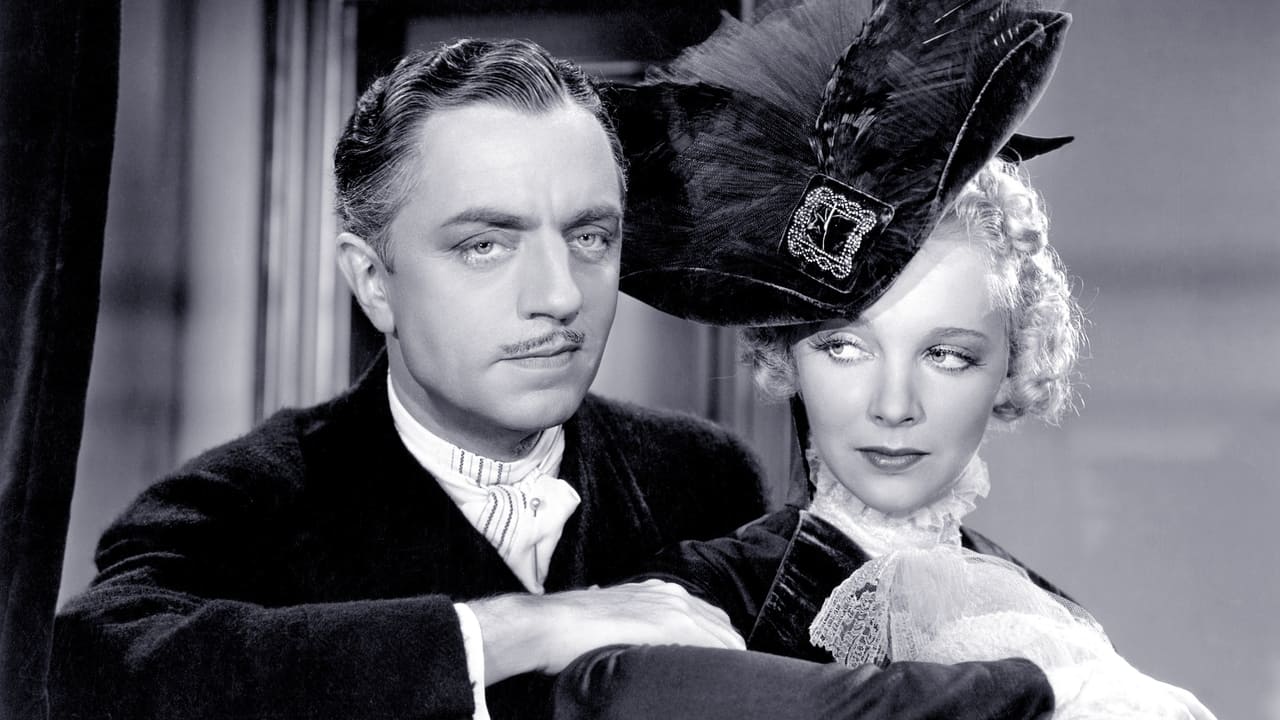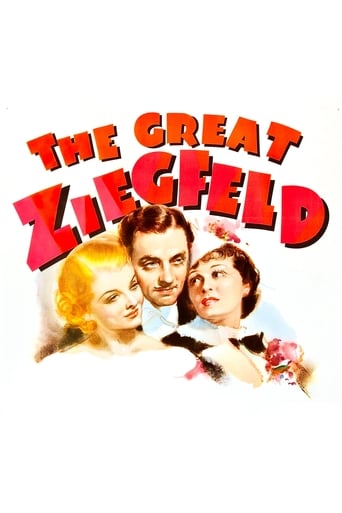

What a waste of my time!!!
... View Morejust watch it!
... View MoreA bit overrated, but still an amazing film
... View MoreStory: It's very simple but honestly that is fine.
... View MoreIn the grand tradition of MGM and only 4 years after Ziegfeld's death, came this biographical film of his life. What a life it was, as this film proves over and over again. William Powell is the absolute perfect choice to play the great showman. He never got as rich as his name seemed to indicate he would be, but he is portrayed with a heart of solid gold. Terrific in support as always, Frank Morgan here has a bigger role as Ziggy's foe than even the Wizard of Oz could imagine. He plays it perfectly, as the bombastic Morgan is at his best in this one. The women, especially Myrna Loy are good too. The listed cast is nowhere near as long as the unaccredited one which says something about the size of MGM when this was made.Considering the lingering effect of the depression, MGM, like Ziegfeld took a major bath on this film. Of course as the film goes, Ziegfeld spent money faster than he could make it, yet continued to defy the gravity of his being broke and did more on the live stage than any other Producer of his time. His life is like this film production, huge and over the top. This is a 5 star film in every aspect, and one of the better tributes to live theater on Broadway before and after the depression ever made. Shows like Rio Rita, Showboat, and others were magnificent and some of them led to movies. It is hard to imagine what would have been different without Ziggy's Follies, and Canter, WC Fields, and so many others who became stars in his era, in his shows. The cameo by Fanny Brice is one of her all too few film roles and is not to be missed. The same is true of this film.
... View MoreOnce I saw "Funny Girl" I assumed the beauties in the Follies could never compare to the 20s/30s standard and wow was I surprised. Those girls were truly beautiful, tip to toe and talented! Typically when you see even 40's musicals, you just assumed that women's stature, legs and poise eventually evolved to todays uber standard. However, in this epic biopic every dame is a winner. I figured since they were'nt wearing mini-skirts and bikinis in those days it was not as hard to compete for men's attentions. I have been to many stage productions and could never imagine seeing moving sets with dancing girls on mattress tops. The LA Hard Rock show probably is the closet to this technique and I was over the top with just their small interpretation. But in the 20's? How truly shocking, exciting, and spectacular! Ziegfeld was a genius to attract all that talent to produce unforgettable moments in entertainment history. I had no idea his shows visualized profound eye candy, particularly the sets.I found the movie too long and was not prepared to see almost full shows and routines. But this is more documentary format than stage play. Ray Bolger exhibited enormous talent that only shone through slightly in the Wizard of Oz. Amazing how many characters from this film ended up together again in 1939.I did not find the Helm character interesting and her phone scene was overly dramatic and tired. She reminded me of the woman who played Joan of Arc, the silent version, very expressive eyes. I also did not see the appeal for Fanny Brice, Streisand probably spoiled that image for me.Powell never disappoints and is aged well into his final moments. I watched this film primarily for his performance and this role was most likely very gruelling given the length and amount of dialogue.High recommend for appreciating Ziegelds's early musical stage shows, the bevy of leggy beauties and fabulous sets.
... View MoreAS WE CHOSE to make this our next, lucky victim to be vetted before America and the World, we first did our homework. Consulting such esoteric sources of knowledge as the World Book Encyclopaedia and our own personal favourite, Wikipedia, we stockpiled a treasure trove of background information about the famous Mr. Florenz Ziegfeld, Jr.BORN IN CHICAGO (coincidently our home town!), he was the product of a German Lutheran Immigrant and a Belgian Roman Catholic Mother. Father ran the CHICAGO MUSICAL COLLEGE and opened a nightclub, the Trocadero, in time to ca$h in on the glut of business in the Windy City during the WORLD'S COMUMBIAN EXPOSITION of 1893.IT WAS AT this point when Ziegfeld the Younger contracted with European Stage Strongman, Eugen Sandow and proceeded to employ his act at the Trocadero, as well as at the Midway* of the Fair; which was being held at the Jackson Park Lakefront sight.HERE IS WHERE our story begins in the film, THE GREAT ZIEGFELD (MGM, 1936).THE STORY OPENS with Sandow's feats of strength bringing only modest receipts at the gate. Ziegfeld (William Powell) suggests that Sandow** (Nat Pendelton) should put the Barbell lifting and Horse Shoe bending on the back burner in favor of physique display. Striking various poses, from all angles, Sandow would animate the presentation with routines employing "muscle control"; which is the contraction and relaxation of the various muscular groups, without actually moving anything.ZIEGFELD QUICKLY MOVES on to the vaudeville stages and to Broadway, producing musicals, discovering lovely female performers and culminating with his greatest triumph, the ZIEGFELD FOLLIES.TAKING THE NAME from the famous Parisian FOLLIES BERGERE, they were the most widely popular musical extravaganzas in America or even the World. The story traces their development and chronicles their year by whomever kit is that Flo is featuring as his headliner. Will Rogers, Fanny Brice, W.C. Fields and Eddy Cantor were among his finds.A VERY HUGE AND outstanding cast was assembled in order to give the film the importance that such a biography deserves. In addition to William Powell, we have: Myrna Loy (Billie Burke-wife # 2)), Louise Rainer-Wife # 1), Frank Morgan, Fanny Brice (playing herself), Virginia Bruce, Reginald Owen, Ray Bolger (as Eddie Cantor) and a cast of hundreds (at least).THE NEARLY THREE hour film traces a career that was built on manic energy and confidence. It has highs and lows with romance and heart break, family and solitude, reverence and vulgarity. It covers his life respectfully, right up to his death bed in 1932.WE HAVE TO address on point before waving bye-bye. As to the notion that Ziggy launched the career of Sandow, many feel that it was really the other way around; for, without Sandow, we'd have never known Mr. Ziegfeld.THIS MARATHON OF a movie gets a highest mark from us, just be in the mood to invest the time.***NOTE * The term "Midway" originated at the 1893 Fair; being the roadway leading to the Fair Grounds, which was lines with all of those "Side Show Attractions." In this case, Sandow and Fan Dancer, Sally Rand were among them.NOTE ** Nat Pendelton's characterization of Sandow makes him sound more like a Hollywood Indian, rather than the German, which he was. He was born in Prussia, April 2, 18967 as Frederick Mueller. He is considered to be the Father of Modern Bodybuilding, Physical Culture and Physique Display (Those "Mr." Contests). The Trophy for the Mr. Olympia contest is called the 'Sandow' Trophy.NOTE *** The popularity of the movie spawned a sort of Musical/Fantasy follow-up with ZIEGFELD FOLLIES (MGM, 1945); again featuring William Powell as a now resident of Heaven, scanning how things are on Planet Earth through telescope and making commentary directly to the audience!
... View More"The Great Ziegfeld", an autobiography of the eponymous Florenz Ziegfeld Jr., was a great success in its time. At almost three hours long, the film illustrates pretty much the man's entire career, from the 1893 World's Fair until his death in 1932. Chronicling his relationship with various acts and his creative use of marketing to win over rival Jack Billings (Frank Morgan), we also watch his romantic interest in Anna Held (Luise Rainer) develop, whom was initially an act he signed on. After the two of them marry, in 1907, his most famous and successful production, "The Ziegfeld Follies", begins.One of the themes in Ziegfeld's life is his need for more shows, more success, more glitter and glam. This is both his crowning glory and his downfall, as it leads to his great successes, but also to his eventual end. He is always looking for more acts, more girls to fall in love with, more audiences to impress. By 1913, Anna has decided to file for divorce. Always the playboy, Ziegfeld soon marries another actress, Billie Burke (Myrna Loy), and they have a daughter. As times change and live stage shows become less popular. Ziegfeld is forced to borrow, then partner with his former rival. Various scenes are unnecessary (especially those of the early years in his career, as he tries to begin a relationship with Anna Held (Luise Rainer)), as well as the numerous lavish dance and song numbers, which are entertaining at first, but all blend together as one by the end of the film. The real life man is best known for "The Ziegfeld Follies," also the best produced aspect of the film. About thirty minutes of footage from this production are illustrated. Other notable scenes include Ziegfeld facing bankruptcy during The Great Depression, eliciting an emotional moment for the audience. The dramatized version of his death in the closing scene is also notably representative of the man's entire life and career, although obviously unreal. Ziegfeld hallucinates his "glory days", his last words being, "More steps. Higher! Higher! Higher!". Entertaining at times, but much too long, this film accurately describes an iconic man. The problem is that with his real-life wife overlooking production, the accurate characterization was missing the flaws every man has. The result is a film that seems all to much like fiction.
... View More